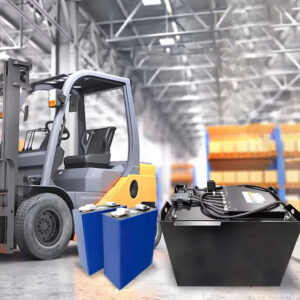General News
Industrial Battery Storage and Big Battery Manufacturers: Industry Applications
As industries across the globe strive for greater efficiency and sustainability, industrial battery storage and the role of big battery manufacturers have become increasingly significant. These technologies are central to enhancing energy storage capabilities and supporting the growth of electric-powered industrial equipment, including industrial vehicles and other heavy-duty machinery. This article explores how industrial battery storage and big battery manufacturers contribute to various industries and their applications.
Industrial Battery Storage in Industrial Applications
Industrial battery storage is essential for the efficient management of energy in numerous industrial sectors. It involves the use of large-scale battery systems to store energy, often generated from renewable sources such as solar or wind, for use when demand exceeds production. The ability to store energy is especially valuable for industries where energy demand is high but fluctuates throughout the day, such as in manufacturing facilities, logistics, and construction.
One of the primary applications of industrial battery storage is in industrial vehicles, particularly electric-powered forklifts, automated guided vehicles (AGVs), and other material handling equipment. These vehicles require reliable and long-lasting batteries to operate efficiently throughout the workday. Industrial battery storage systems ensure that these vehicles can maintain their operations without frequent recharging interruptions. Moreover, the development of advanced lithium-ion batteries has led to significant improvements in energy density, charging times, and overall battery lifespan, which are crucial factors for industrial vehicles that operate in demanding environments.
Additionally, battery storage systems help improve energy resilience by providing backup power to industrial operations during peak demand periods or when grid power is unavailable. This capability is particularly important for facilities that rely heavily on continuous operations, where even short periods of downtime can result in significant losses.
Big Battery Manufacturers and Their Role
Big battery manufacturers play a pivotal role in the growth of industrial battery storage solutions. These manufacturers design and produce batteries capable of handling large-scale energy storage needs across various sectors. Among the most well-known companies in the field are those focused on creating high-performance, scalable battery systems that cater to the needs of industries such as transportation, construction, and manufacturing.
For example, large-scale batteries are increasingly used in electric trucks and buses, where energy storage systems must be capable of supporting heavy-duty operations while also offering long operational lifespans. Big battery manufacturers must therefore focus on both the capacity of the batteries and their efficiency in managing energy across different types of vehicles and machinery. In addition, manufacturers are investing in battery management systems (BMS) that optimize performance and ensure safety, which is critical for industries requiring the safe operation of large electric equipment.
Furthermore, big battery manufacturers are crucial in enabling renewable energy integration into industrial processes. By providing energy storage solutions, they allow for the capture of excess energy generated from renewable sources and its use during periods of high demand. This makes industrial facilities more flexible and capable of reducing their reliance on non-renewable energy sources, contributing to overall sustainability goals.
The Integration of Industrial Battery Storage and Big Batteries in Industrial Vehicles
The integration of industrial battery storage and big batteries into industrial vehicles has become more sophisticated in recent years. Manufacturers are developing batteries that are not only powerful but also more compact, lightweight, and adaptable to the varied needs of different industrial vehicles. For instance, electric forklifts powered by high-density lithium-ion batteries can operate for longer hours, reducing the need for downtime and recharging. This increases operational efficiency and decreases costs associated with fuel consumption and maintenance.
Moreover, automated industrial vehicles, such as autonomous material handling systems, depend on reliable battery storage to perform tasks continuously without human intervention. Battery systems that provide consistent power without frequent recharging are integral to the development of these autonomous systems, enhancing their effectiveness and reducing operational disruptions.
In conclusion, industrial battery storage and the innovations driven by big battery manufacturers are crucial for the development of energy-efficient, reliable, and sustainable industrial vehicles. These systems improve energy management, increase the reliability of industrial operations, and support the transition towards a more sustainable industrial landscape. The continued advancement of battery technology will likely further enhance these applications, offering more solutions to industries seeking to optimize their operations.










 Solar Panel
Solar Panel Solar Power System
Solar Power System